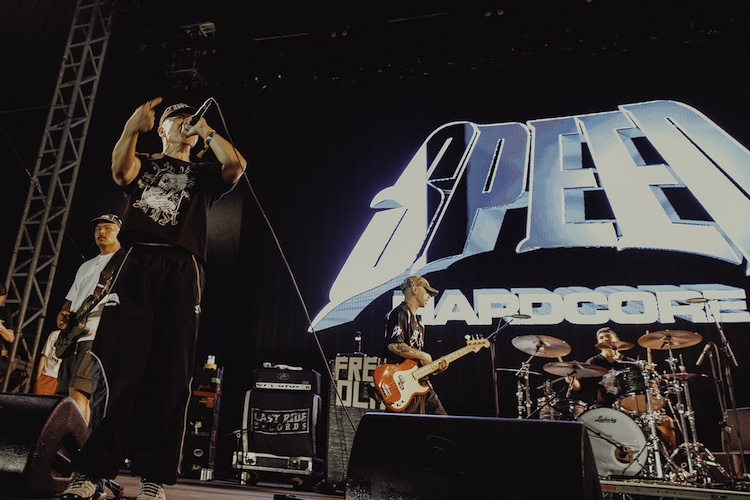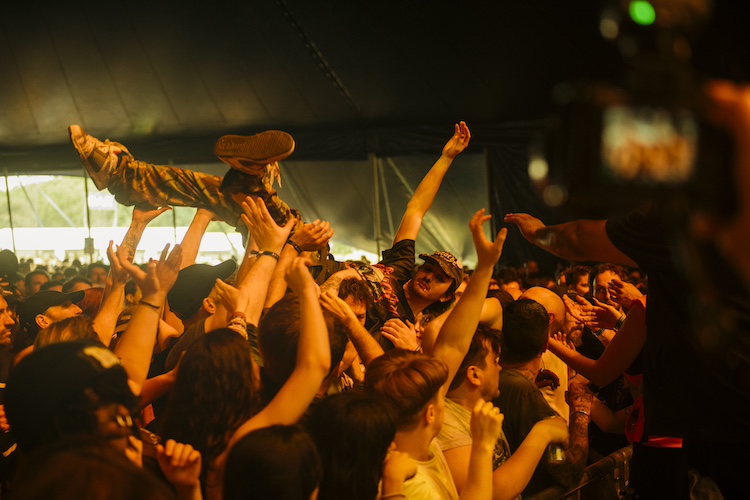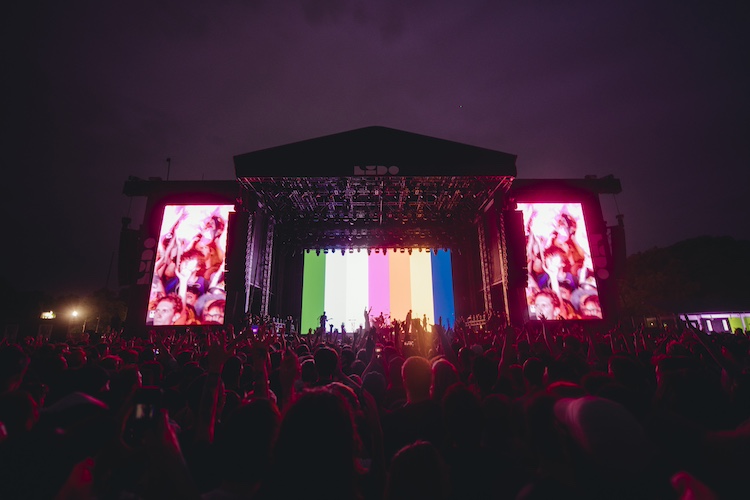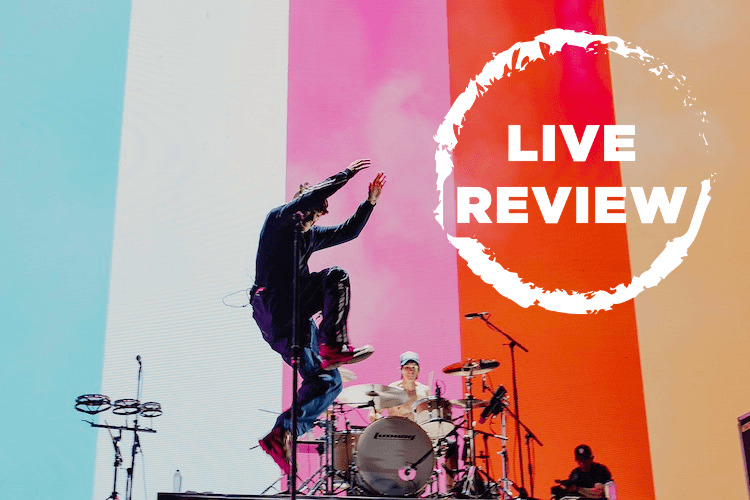London, Victoria Park, 13/06/25
On Outbreak Festival’s first foray into London, the clouds threatened to burst all day. At Victoria Park, with thousands of moshers pouring in through the gates, it was hot and uncomfortably muggy. Still, the heat and the threat of rain didn’t deter anyone from cramming into tents, often shirtless, working up a sweat two-stepping and crowd killing.
The first Outbreak, founded by two fourteen-year-olds, was in Sheffield in 2011. It then moved to a slightly bigger venue in Leeds, retaining its spirit with a roster that meant nothing to most people outside the scene. Bigger bands like Title Fight, Turnstile, Higher Power and Malevolence featured, and as Outbreak bounced between venues, its popularity grew with it. They hosted big-name reunions and comeback shows, with a fierce evangelism among its devotees.
When Outbreak moved to the 5,000 capacity Bowlers Exhibition Centre in Manchester in 2022, adding in a skate ramp and additional stages, it seemed as if that was as big as it could get. That was until they announced that, in 2025, an event in London would take place the day before their usual two-day festival in Manchester.
Taking place as part of the wider LIDO festival in Victoria Park, frequent attendees worried that it might lose some of the things that make Outbreak feel so unique compared to other alternative music festivals. Despite softer additions to the lineup in recent years, like American Football and Joyce Manor, Outbreak is still at its heart a hardcore festival. That means, for one thing, zero barriers. At the flagship event in Manchester, there is no divide between the crowd and the band, literally or figuratively. Everyone (who has signed a waiver) is free to climb on stage, stagedive, and run around windmilling to their heart’s content.
One of the first bands of the day, Australian hardcore band Speed, were keen to ensure that the presence of a barrier didn’t dampen the spirits of the crowd. Frontman Jem Siow was very specific with his instructions, telling the audience to pogo, two-step and mosh at different points. One person later commented, “why do you think they all look so ripped? Their shows are like a HIIT class.” With fans spilling out of the tent, the audience kept up the energy as they played fan favourites and tracks from last year’s debut album ‘Only One Mode’.

If the London installation of Outbreak suffered at all, it was down to organisers having to fit into someone else’s setup and not quite accounting for how popular certain acts would be. For the bands in the small tent known as The Club, like Jane Remover, there was a snaking queue where people had to wait to be let in. This was particularly disappointing when it came to cult emo favourites Sunny Day Real Estate, who played a setlist including several tracks from 1994’s iconic ‘Diary’ to the lucky few who’d been let in while dozens of people waited outside and craned their necks to get a look. Of those inside, many had been waiting at least an hour beforehand, not wanting to miss the band.
At the same time, Kentucky’s Knocked Loose played to a huge crowd in the bigger tent. With a setlist that included tracks from 2024’s ‘You Won’t Go Before You’re Supposed To ‘alongside those from their earlier two records and some deeper cuts, they inspired some of the more chaotic behaviour of the day, with fans happy to do whatever frontman Bryan Garris asked of them. The crowd, both inside and outside the tent, screamed along with ‘Suffocate’, the track featuring Poppy that got them onto Jimmy Kimmel and nominated for Best Metal Performance at the 2025 Grammys. ‘Suffocate’ is another example of the crossover appeal that will define the London Outbreak, which seems to eschew the gatekeeping of hardcore in favour of drawing a bigger audience.

The same tent was packed and sweaty for beloved Long Island post-hardcore band Glassjaw, who would play two more shows over Outbreak weekend, performing 2000’s ‘Everything You Ever Wanted to Know About Silence’ and 2002’s ‘Worship and Tribute’ in full on Saturday and Sunday in Manchester. For London, they gave the crowd a more mixed setlist that included tracks from 2017’s ‘Material Control’ and EP ‘Our Colour Green’. While the crowd was somewhat more subdued than it was for the newer hardcore acts, it felt more like reverence than boredom. Frontman Daryl Palumbo danced and screamed with an energy that seems hard to keep up for a full weekend, and when the band ripped into fan favourite ‘Siberian Kiss’ to close, everyone rushed forward and started crowd surfing. That sweaty, communal chaos is the spirit of Outbreak, and it wasn’t missing in London.

The highlight, even the draw of the entire day for some, was a band that wouldn’t be appearing that weekend in Manchester: Turnstile. With recent poppy record ‘Never Enough’ and 2021’s melodic hardcore ‘Glow On’, Turnstile have accrued fans and acclaim far outside of their once small circle. It’s undeniable that it’s at least in part Turnstile’s popularity that has drawn such a huge crowd to London on this hot, muggy Saturday, with many attendees waiting all day to see Turnstile take on the main stage. But – true to their roots – Turnstile don’t make it too easy for the newcomers. Playing mostly tracks from ‘Glow On’ and a handful of songs from their earlier hardcore albums and EPs, Turnstile more than earned the huge pit that opened up in front of them.

A little while into Turnstile’s set, the heavens finally open. Undeterred, frontman Brendan Yates didn’t even comment on the storm now forming over the festival. He kept on singing and dancing, with light, almost balletic moves that sometimes feel at odds with the weight of the music. But it’s that mix of heavy and light that make Turnstile so accessible, and it’s a particular star power on the part of the band that makes it clear that this won’t be the peak of their success. With a great performance by newcomer and London local Meg Mills, as well as a surprise appearance from Dev Hynes for ‘ALIEN LOVE CALL’, the rain doesn’t slow anyone down.
As for whether the community loses anything by a move to such a big venue? Watching Turnstile, it’s hard to be cynical, and it’s hard to not want the best for a scene that is so adept at bringing people together. Yates references their first performance at Outbreak in 2013, at The Vox, a converted warehouse with a capacity of 1300 on the edge of Leeds. “Here we all are together, 12 years later,” he says. And who wouldn’t want us all to go even further, together?
Content shared from rocksound.tv.

